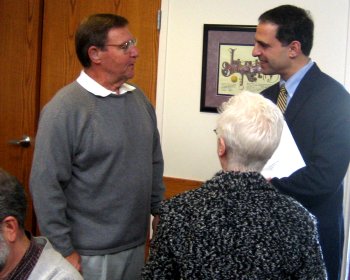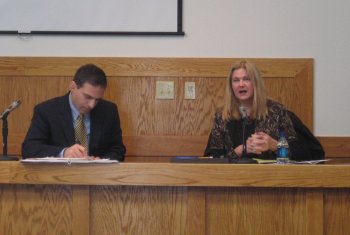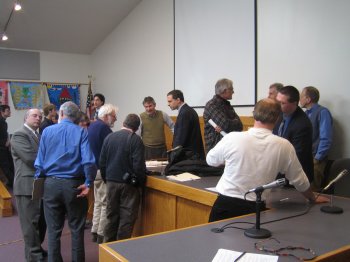- By Dan Veaner
- News
 Print
Print
Saturday morning Congressman Michael Arcuri led a round table discussion on alternative energy sources. Lansing Town Hall was filled with interested people from around Tompkins County. It was Arcuri's first return to Lansing since a few days before the election that sent him to Washington last year. "We've passed some legislation recently with respect to alternative energy," Arcuri said. There is going to be some money that we'll have available. So I thought what better way to learn how to apply that money than to have a round table discussion."

Lansing Supervisor Steve Farkas chats with Congressman Arcuri
In his less than two months in office Arcuri cosponsored two pieces of legislation that will encourage development of alternative energy sources. In the first two weeks of Congress the CLEAN Energy Act (H.R. 6) reinstated fees on major oil companies who drill on federal lands that Arcuri says are expected to generate more than $14 billion over the next ten years. This money has been earmarked for a new fund that will be used strictly for the development of alternative energy.
The second piece, the Advanced Fuels Infrastructure Research and Development Act (H.R. 547) , is an appropriation by the Science Committee to make alternative fuels like cellulosic ethanol affordable and accessible. "One of the problems is -- we talk so much about ethanol, but the infrastructure is not suitable for ethanol," Arcuri explained. "Ethanol is much more corrosive to the infrastructure, to the pipes, than gasoline is, so you can't really ship ethanol in the same infrastructure you can ship gasoline. We appropriated money do begin to develop infrastructure that is suitable for ethanol and gasoline. We need to make sure these things are in place so that as we start to promote this, we can actually do it."
Arcuri spent most of the session taking notes as panelists outlined their thoughts on the best strategies and technologies. The panel was moderated by Research Associate Stephane Corgie from Cornell's Biological Environmental Engineering Department, and included Caroline Town Supervisor Don Barber, PhD Program Coordinator for Sustainable Tompkins Gay Nicholson, Performance System Development Inc.'s Chris Balbach, Taitem Engineering President Ian Shapiro, Cornell Cooperative Extension Executive Director Kenneth Schather, and Caroline Town Councilman Edward Cope. Each spent about ten minutes to make a presentation, after which the floor was opened to the public.
Barber began by noting that the Town of Caroline is one of the first to purchase wind power as its sole energy source. He said this was done with private donations by town board members that encouraged others to contribute, taking the burden off of taxpayers. The Town also formed an energy independence committee. He urged state and federal programs that will help local governments provide alternative energy as incentives, rather than mandates.
Providing incentives was a theme among the speakers, and there were some surprising and sometimes conflicting observations. A few panelists noted that New York can't produce enough corn for both ethanol and food, meaning that it may not be the best choice as an alternate energy source. Some promoted the use of grass pellets because grass is more quickly and easily grown. But Nicholson noted that the high ash content must be dealt with before they become viable.
Nicholson urged thoughtful planning before putting programs in place. "We must watch out for unintended consequences as we redesign and transition to a new energy economy," she warned. "The corn ethanol plants, which are popular all across the nation, has already driven up the price of corn up to about 70%, causing people in Mexico to have trouble buying their main food supply. That is probably going to drive immigration to the United States. So we need to pay attention to the outcomes of our choices."

Michael Arcuri takes notes while Gay Nicholson speaks
Others stressed that conservation and efficiency of current technologies must be a significant component of an energy plan. "It's about the fastest return you can get on a macro scale, dollar for dollar," Schather said. "It's going to generate your biggest return in part because we have an infrastructure already in place.
When the floor was opened to questions and comments, a number of perspectives were evident. County Legislator Martha Robinson urged federal support of projects like municipal sewers that increase population density and reduce energy usage because of the economies of scale. But when pressed by Lansing Supervisor Steve Farkas she stopped short of expressing her support of County support of Lansing's proposed sewer project. Arcuri noted that there are two pending bills that will provide support and grants for water filtration projects if they are passed.
Farkas noted that when the Town of Lansing installed solar panels at the Highway Department it was estimated that it would pay for itself in about 14 years, and with State support the Town was encouraged to go ahead with the project. "As of about a week ago we now think it will be about an eight year buy-back. We had a NYSERTA grant for it and we're very appreciative of that." He also urged efficiency for freight railroads, saying that if the same trains that bring coal to the power plant in the north of town could carry salt out it would halve the amount of rail traffic and resulting energy expenditure.
Frank Barry asked the Congressman to address transportation issues that would encourage train travel, saying that it is more energy efficient that traveling by automobile. He said that the government should force railroads to give priority to passenger trains during the day when people want to travel, rather than assigning limited tracks to freight trains.
Greg Lawrence asked Arcuri to consider ways to make information about alternative energy more widely available. "All federal funded research should be required to be placed in the public domain," he said. He also urged Arcuri to work on forcing the Environmental Protection Agency (EPA) to put its documentation on-line.

Caroline Supervisor Don barber and Congressman Arcuri (center)
chatting with attendees and panelists after the roundtable discussion
"There are some wonderful ideas floating around the room, but there are some philosophical issues that I would like to see you keep in mind," said Ithaca Biodiesel's Tycho Dan. "As far as what we can do today, right now, as far as what, Mr. Arcuri, you can do in our government for us right now efficiency is without a doubt the most effective use of our tax dollars to lower carbon emissions."
But Dan also said that the government has to make it easier for groups like his to get new technologies off the ground. "There's a real opportunity for leadership in this area, particularly in New York and California," he said. "The social environment is uniquely suited to ushering in leadership on these issues."
Arcuri said that the country needs a unified energy policy, and that it needs to implement new technologies as an example to others they want to encourage to do so as well. He said he would take the information from the Lansing session back to Washington to help determine how alternative energy dollars should be spent. "We need to put all of these into place by having an energy policy," he said. "One of the directions that I think you will see in Congress will be a focus on alternative energy and global warming."
----
v3i8

Lansing Supervisor Steve Farkas chats with Congressman Arcuri
The second piece, the Advanced Fuels Infrastructure Research and Development Act (H.R. 547) , is an appropriation by the Science Committee to make alternative fuels like cellulosic ethanol affordable and accessible. "One of the problems is -- we talk so much about ethanol, but the infrastructure is not suitable for ethanol," Arcuri explained. "Ethanol is much more corrosive to the infrastructure, to the pipes, than gasoline is, so you can't really ship ethanol in the same infrastructure you can ship gasoline. We appropriated money do begin to develop infrastructure that is suitable for ethanol and gasoline. We need to make sure these things are in place so that as we start to promote this, we can actually do it."
 (Left to right) Panelists Don Barber, Stephane Corgie, Michael Arcuri, Gay Nicholson, Chris Balbach, Ian Shapiro, Kenneth Schather, and Edward Cope. |
Barber began by noting that the Town of Caroline is one of the first to purchase wind power as its sole energy source. He said this was done with private donations by town board members that encouraged others to contribute, taking the burden off of taxpayers. The Town also formed an energy independence committee. He urged state and federal programs that will help local governments provide alternative energy as incentives, rather than mandates.
Providing incentives was a theme among the speakers, and there were some surprising and sometimes conflicting observations. A few panelists noted that New York can't produce enough corn for both ethanol and food, meaning that it may not be the best choice as an alternate energy source. Some promoted the use of grass pellets because grass is more quickly and easily grown. But Nicholson noted that the high ash content must be dealt with before they become viable.
Nicholson urged thoughtful planning before putting programs in place. "We must watch out for unintended consequences as we redesign and transition to a new energy economy," she warned. "The corn ethanol plants, which are popular all across the nation, has already driven up the price of corn up to about 70%, causing people in Mexico to have trouble buying their main food supply. That is probably going to drive immigration to the United States. So we need to pay attention to the outcomes of our choices."

Michael Arcuri takes notes while Gay Nicholson speaks
Others stressed that conservation and efficiency of current technologies must be a significant component of an energy plan. "It's about the fastest return you can get on a macro scale, dollar for dollar," Schather said. "It's going to generate your biggest return in part because we have an infrastructure already in place.
When the floor was opened to questions and comments, a number of perspectives were evident. County Legislator Martha Robinson urged federal support of projects like municipal sewers that increase population density and reduce energy usage because of the economies of scale. But when pressed by Lansing Supervisor Steve Farkas she stopped short of expressing her support of County support of Lansing's proposed sewer project. Arcuri noted that there are two pending bills that will provide support and grants for water filtration projects if they are passed.
Farkas noted that when the Town of Lansing installed solar panels at the Highway Department it was estimated that it would pay for itself in about 14 years, and with State support the Town was encouraged to go ahead with the project. "As of about a week ago we now think it will be about an eight year buy-back. We had a NYSERTA grant for it and we're very appreciative of that." He also urged efficiency for freight railroads, saying that if the same trains that bring coal to the power plant in the north of town could carry salt out it would halve the amount of rail traffic and resulting energy expenditure.
Frank Barry asked the Congressman to address transportation issues that would encourage train travel, saying that it is more energy efficient that traveling by automobile. He said that the government should force railroads to give priority to passenger trains during the day when people want to travel, rather than assigning limited tracks to freight trains.
Greg Lawrence asked Arcuri to consider ways to make information about alternative energy more widely available. "All federal funded research should be required to be placed in the public domain," he said. He also urged Arcuri to work on forcing the Environmental Protection Agency (EPA) to put its documentation on-line.

Caroline Supervisor Don barber and Congressman Arcuri (center)
chatting with attendees and panelists after the roundtable discussion
"There are some wonderful ideas floating around the room, but there are some philosophical issues that I would like to see you keep in mind," said Ithaca Biodiesel's Tycho Dan. "As far as what we can do today, right now, as far as what, Mr. Arcuri, you can do in our government for us right now efficiency is without a doubt the most effective use of our tax dollars to lower carbon emissions."
But Dan also said that the government has to make it easier for groups like his to get new technologies off the ground. "There's a real opportunity for leadership in this area, particularly in New York and California," he said. "The social environment is uniquely suited to ushering in leadership on these issues."
Arcuri said that the country needs a unified energy policy, and that it needs to implement new technologies as an example to others they want to encourage to do so as well. He said he would take the information from the Lansing session back to Washington to help determine how alternative energy dollars should be spent. "We need to put all of these into place by having an energy policy," he said. "One of the directions that I think you will see in Congress will be a focus on alternative energy and global warming."
----
v3i8



